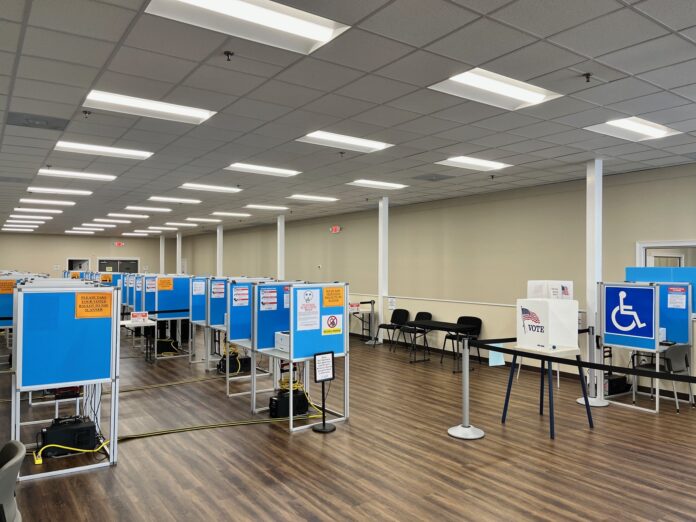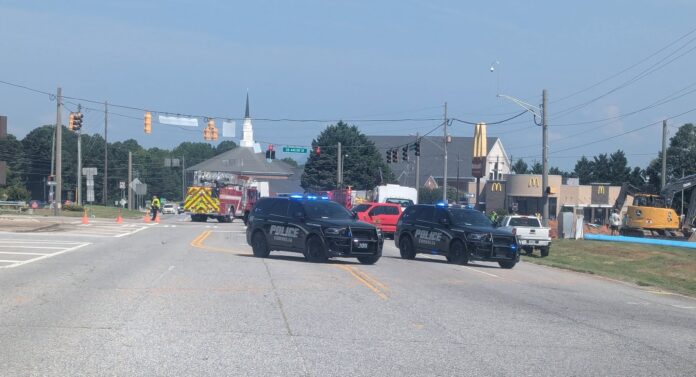(
Georgia Recorder
) — For the first time since 2020, Georgia voters have a chance to decide who will represent them on the Public Service Commission. This delayed election comes after a
lawsuit
challenged the statewide elections used to elect commissioners, arguing it diluted the voting strength of Black voters.
Despite each commissioner hailing from a specific geographic district in Georgia, voters across the state are eligible to vote for each member. This year, District 2 and 3 seats are on the ballot. The 2025 election comes as commissioners face criticism for signing off rising rates for Georgia Power customers. After June’s primary election, winners will advance to the general election in November that will coincide with municipal elections across the state.
With early voting already in full swing, about 18,000 people have cast a ballot as of Monday, according to the Secretary of State’s
data hub
.
RELATED
Habersham early voting dates, times, and locations
When is the election?
The primary election will take place on June 17. Early voting began May 27 and will end June 13. If a candidate does not receive at least 50% of the vote in the primary, a runoff election will be held on July 15.
Voters can check their registration status, polling information and sample ballots on the Georgia Secretary of State’s
My Voter Page
.
What is the Georgia Public Service Commission?
The PSC is a five-member commission that is tasked with regulating electric, telecommunication and natural gas services.
Why is this an important election for voters?
The commissioners’ decisions and outcomes directly affect how much people in Georgia pay for necessary utility services. Their
website
points out that “very few governmental agencies have as much impact on peoples’ lives as the PSC.”
Despite this impact, PSC elections tend to have low visibility and voter turnout across Georgia. University of Georgia political science professor Charles Bullock attributes that partly to limited campaign capability.
“I’ve often said that most Georgians [are] probably not fully aware we have a public service commission, don’t know that it has five members, and couldn’t name a single one of them,” Bullock said.
With limited campaign finances and awareness, it can be tough for candidates to reach voters. As a political scientist, Bullock said he often uses the PSC as an example when trying to identify what partisan division exists in the state. He says that when people vote for the PSC election with limited knowledge they tend to fall back on their preferred party.
“Georgia is still more Republican than Democratic, so I think ultimately, probably the incumbent Republicans are going to win,” Bullock said. “It also helps that once we get to the general election ballot, it’ll have the ‘I’ beside their name, indicating they are the incumbents.”
What will my ballot look like?
In District 2, incumbent Commissioner Tim Echols is running for re-election. If elected, this would mark the beginning of his third term as a commissioner. Echols will face Lee Muns on the Republican ballot. Alicia M. Johnson is running uncontested on the Democratic ballot. District 2 goes as far north as Hart County and as far south as Savannah.
In District 3, which includes Clayton, DeKalb, and Fulton counties, incumbent Commissioner Fitz Johnson is the sole candidate on the Republican ballot this month. Gov. Brian Kemp appointed Johnson to the seat in 2021.
All the action in this race is on the Democratic side right now, with four candidates trying to clinch the nomination.
Daniel Blackman, who served as the Environmental Protection Agency’s Southeast regional administrator during the Biden administration, is
fighting
to remain a candidate. Blackman was disqualified after Secretary of State Brad Raffensperger agreed with an administrative court judge that he did not have the adequate residency qualifications to run. A Fulton County Superior Court judge granted an injunction allowing Blackman to remain on the ballot for now. A hearing on Blackman’s appeal is set for June 10.
Other Democratic candidates include Peter Hubbard, who is the founder of the clean nonprofit Center for Energy Solutions, former utility executive Robert Jones and Keisha Sean Waites, who is a former Atlanta City Council member and ex-state representative.
Why are there separate ballots for the PSC primary election?
The PSC primary is a partisan election and requires voters to choose a Democratic or Republican ballot. The primary election will not occur at the same time as any municipal elections. This will not be true for the general election. For cities with municipal general elections also occurring on Nov. 4, different ballots will be offered for each election.
The partisan nature of the primary election often contributes to low voter turnout.
“Many people do not turn out for primaries,” said Travis Doss, president of the Georgia Association of Voter Registration and Election Officials and Richmond County’s election director. “They do not feel that they have an affiliation with a party, so there’s always confusion when it comes to primaries. People argue with us that they should be able to vote for both sets of candidates.”
This was true for a Richmond County woman who recently came in ready to cast her vote but ended up telling Doss that she would not be picking a party.
Why is this an irregular election cycle?
A 2020 lawsuit brought forth by Black voters in Atlanta delayed years of PSC elections and challenged the electoral process that allows statewide voters to elect district-specific commissioners. Plaintiffs argued that this is a violation of Section 2 of the Voting Rights Act and dilutes the voting power of Black Georgians. The U.S. Supreme Court ultimately decided not to hear the case, and the at-large method of electing commissioners remains in place.
What are some issues surrounding the current PSC?
Critics and consumer watch groups have continued to express concerns over rate prices, growing electricity demands and the spread of data centers. According to previous Georgia Recorder
reporting
, the average Georgia Power residential customer pays about $43 more to cover base electric rate increases, recover excess fuel expenses, and cover the cost of completing two new nuclear power generators at Plant Vogtle.
PSC staff and Georgia Power reached a proposed agreement
to “freeze”
base electric rates from 2026 to 2028.
Critics have pointed out that Georgia Power customers could still see an increase on their utility bill after the approval of funds for storm damage and fuel recovery expenses.

 by
by 

